Introduction
Welcome to the dynamic world of real estate marketing, where every listing tells a story, and every strategy is a stepping stone to success! In an industry where competition is fierce, mastering real estate marketing is not just an option—it’s a necessity.
Studies show that 92% of homebuyers use the internet to search for homes (Nationtion of Realtors, 2021 Home Buyers and Sellers Generational Trends Report), highlighting the critical need for effective online real estate marketing strategies you’re a seasoned real estate agent or just starting out, understanding the ins and outs of effective real estate marketing can significantly boost your visibility and client engagement.
In this blog, we’ll explore a variety of real estate marketing strategies designed to elevate your business and connect you with potential buyers.
From the art of storytelling through high-quality content to harnessing the power of social media and email marketing, each section will reveal the tools and techniques that can transform your approach.
Get ready to uncover valuable insights that will empower you to elevate your real estate marketing game and attract more clients than ever before!
What is Real Estate Marketing?
Real estate marketing encompasses a range of strategies aimed at promoting properties and real estate services to potential buyers and sellers.
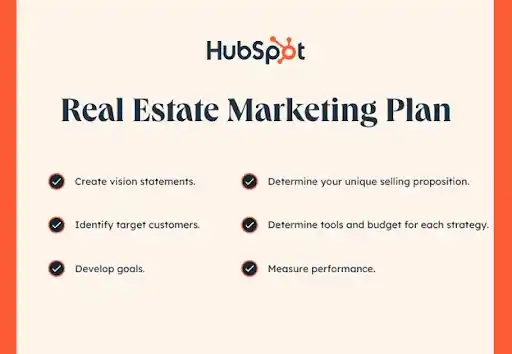
Essentially, it’s about connecting your listings with the right audience, ensuring that your properties stand out in a competitive market.
Effective real estate marketing involves high-quality photography, engaging property descriptions, open houses, targeted online ads, and the use of various marketing tools.
Understanding Your Target Audience
To truly excel in real estate marketing, understanding your target audience is essential.
Knowing who your ideal clients are allows you to tailor your marketing strategies to meet their specific needs and preferences, leading to more effective outreach.
Identifying Your Ideal Client in Real Estate
To succeed in real estate marketing, identifying your ideal client is the first step. Here’s how to define who they are:
- Needs and Preferences: Understand what your clients are searching for in a property. Are they looking for a cozy family home, a luxurious high-rise, or a commercial investment? Tailoring your property listings to these specific needs increases the chances of attracting the right buyers.
- Demographic Factors: Consider key factors such as age, income level, family size, and lifestyle. For instance, young professionals might prefer urban apartments with modern amenities, while retirees may seek quieter suburban homes.
This information helps target your marketing efforts more effectively.
- Pain Points: Understanding the challenges your clients face can enhance your marketing message. Are they struggling to find affordable housing in their desired neighborhoods? Addressing these pain points directly in your marketing materials makes your offerings more appealing.
- Buyer Type: Recognize if your clients are first-time homebuyers, seasoned investors, or those looking to downsize. Each group has distinct needs and expectations, and tailoring your approach accordingly will improve your success rate.
Analyzing Demographics and Psychographics
Effective real estate marketing requires a deep dive into both demographics and psychographics:
- Demographics: Collecting data on age, gender, income, education, and occupation provides a clear picture of your target audience.
This information is invaluable for segmenting your market and creating campaigns that resonate with different buyer segments.
- Psychographics: Going beyond basic demographics to explore the attitudes, values, interests, and lifestyles of your audience is essential.
What motivates your clients to buy or sell? Understanding their hobbies, interests, and lifestyle choices allows you to craft personalized marketing messages.
- Market Research: Conducting surveys, interviews, and focus groups can yield valuable insights into your target audience.
Use this data to create detailed buyer personas that represent your ideal clients.
Steps to Develop a Successful Marketing Strategy
A solid marketing strategy is vital for attracting clients in the competitive real estate market. Here’s how to build one:
Setting Clear Objectives and Goals
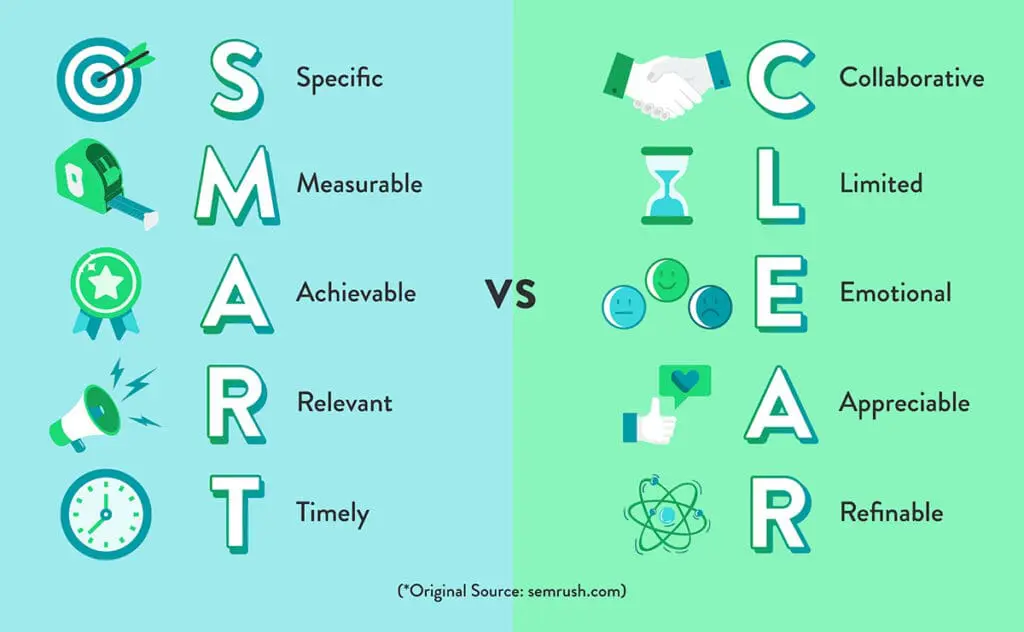
Start by defining clear objectives and goals for your real estate marketing efforts:
- Define Goals: Identify what you want to achieve, such as increasing leads, boosting sales, or enhancing brand awareness.
- SMART Criteria: Ensure your goals are Specific, Measurable, Achievable, Relevant, and Time-bound. For example, a SMART goal might be, "Increase website traffic by 20% in six months." This specificity allows you to track progress effectively.
- Prioritize: Focus on the most critical objectives first to allocate resources efficiently and achieve optimal results. Prioritizing your goals ensures you remain focused on what truly matters.
Budgeting and Allocating Resources
Next, it’s crucial to budget and allocate your resources wisely to maximize the impact of your real estate marketing strategies:
- Determine Budget: Establish a comprehensive budget for your marketing activities. Consider all potential expenses, including advertising, content creation, and technology investments.
- Resource Allocation: Allocate funds to various real estate marketing channels based on their effectiveness. For instance, if you find that social media marketing yields a higher return on investment, dedicate more of your budget to platforms like Facebook and Instagram.
- Technology Investment: Invest in effective tools such as a chatbot for real estate. A chatbot for real estate agents can manage inquiries, provide instant information, and schedule property viewings, enhancing customer engagement and streamlining processes.
Building Your Online Presence
In today’s digital age, building a robust online presence is crucial for successful real estate marketing.
A professional website, coupled with active social media engagement, is key to attracting and retaining potential clients.
Importance of a Professional Real Estate Website
A professional website serves as the cornerstone of your real estate marketing strategy:
- First Impressions: Your website is often the first point of contact potential clients have with your business. A well-designed, user-friendly site creates a strong first impression that can set you apart from competitors.
- Showcasing Listings: Present your property listings using high-quality photos, engaging virtual tours, and detailed descriptions. Ensuring easy navigation allows visitors to find properties that suit their needs quickly.
- Lead Generation: Incorporate lead capture forms, contact information, and clear calls to action.
- Mobile Optimization: Ensure your website is optimized for mobile devices. With many users searching for properties on their smartphones, a responsive design is essential for a positive user experience.
Suggested Reading:
10 Tips for Effective Real Estate Digital Marketing
Leveraging Social Media Platforms for Marketing
Social media platforms serve as powerful real estate marketing tools:
- Facebook: Utilize Facebook to share property listings, host live virtual tours, and run targeted ads that reach specific demographics effectively.
- Instagram: Use high-quality photos and videos to showcase properties, and engage with your audience through stories and reels. Incorporating popular hashtags can also increase visibility.
- LinkedIn: Connect with industry professionals, share valuable market insights, and showcase your expertise to build credibility within the real estate community.
- Twitter: Engage with your audience through real-time updates, share industry news, and participate in relevant conversations to enhance your visibility.
- Engagement: Actively respond to comments and messages, host Q&A sessions, and foster relationships with potential clients to build trust and rapport.
- Analytics: Utilize analytics tools to monitor your social media performance. Track key metrics such as engagement, reach, and conversions to measure the effectiveness of your campaigns and make data-driven decisions.
SEO Strategies for Real Estate
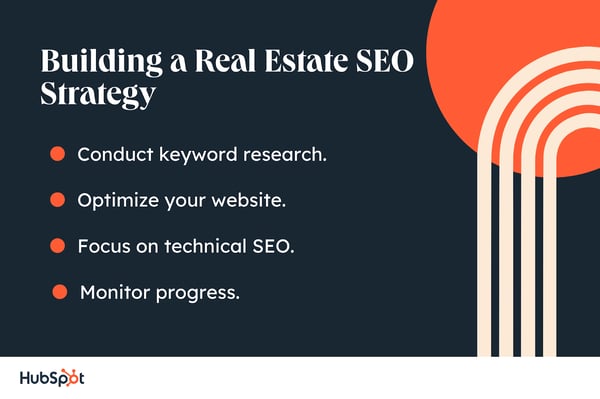
Implementing effective SEO strategies is essential for enhancing your online visibility in the competitive real estate market.
By employing best practices in SEO, your website can achieve higher rankings in search engine results, attract more potential clients, and significantly boost your marketing efforts.
Optimizing Your Real Estate Website for Search Engines
Search engine optimization (SEO) plays a critical role in driving organic traffic to your real estate website. Here’s how to optimize effectively:
Keyword Research
Conduct thorough keyword research to identify relevant terms your target audience is searching for, such as "real estate marketing," "homes for sale," and "property listings."
Use these keywords naturally throughout your content to improve relevance and visibility.
On-Page SEO

Optimize your website’s on-page elements, including:
- Title Tags: Ensure each page has a unique, keyword-rich title that clearly describes its content.
- Meta Descriptions: Write compelling meta descriptions that summarize the page's content while incorporating primary and secondary keywords.
- Headers and Image Alt Texts: Use relevant keywords in headers (H1, H2, etc.) and alt texts for images to enhance SEO and accessibility.
Content Creation
Create high-quality, valuable content that addresses common questions and concerns of your target audience. Consider producing:
- Blog Posts: Share insights on local real estate trends or tips for first-time homebuyers.
- Guides: Develop comprehensive guides on navigating the buying or selling process.
- Videos: Leverage video content for virtual tours of properties or neighborhood showcases.
Technical SEO
Ensure your website is technically sound to provide a good user experience:
- Page Speed: Use tools like Google PageSpeed Insights to test and improve loading times.
- Mobile-Friendliness: Ensure your site is responsive and performs well on mobile devices, as many users search for real estate on their phones.
- Clean URL Structure: Use descriptive, keyword-rich URLs for each page, enhancing both SEO and user navigation.
Local SEO Techniques for Real Estate Agents
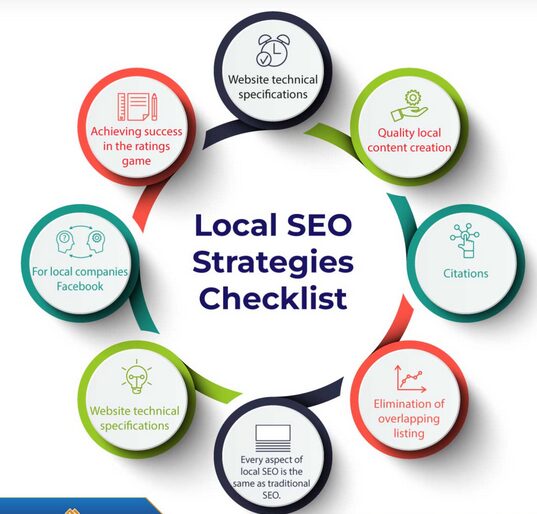
For real estate agents targeting specific geographic areas, local SEO is vital:
- Google My Business: Create and optimize your Google My Business profile, ensuring your business name, address, and phone number (NAP) are consistent across all online listings. This boosts your visibility in local searches and maps.
- Local Keywords: Incorporate local keywords into your content to improve local search rankings. Phrases like "real estate agent in [City]" or "homes for sale in [Neighborhood]" can help attract nearby clients.
- Online Reviews: Encourage satisfied clients to leave positive reviews on Google and other review platforms. Responding to reviews not only builds trust but also enhances your local SEO efforts by signaling engagement.
- Local Listings: Ensure your business is listed in local directories and real estate websites. Consistent NAP information across all platforms improves your visibility and search rankings.
Using Paid Advertising in Real Estate
Leveraging paid advertising can effectively target specific audiences and yield immediate results. By utilizing various advertising platforms, you can drive traffic and generate leads for your business.
Understanding PPC (Pay-Per-Click) Advertising

PPC advertising is a potent tool in real estate marketing:
- Immediate Results: Unlike SEO, which takes time to yield results, PPC campaigns can generate immediate traffic to your website.
- Targeted Advertising: Use PPC to target specific demographics, locations, and search queries, ensuring your ads reach potential clients actively seeking real estate services.
- Budget Control: Set a clear budget for your PPC campaigns to manage costs effectively. Regularly monitor your campaigns to ensure you're achieving a solid return on investment.
Ad Formats
Utilize a variety of ad formats to maximize your reach:
- Search Ads: Appear at the top of search results when users look for relevant keywords.
- Display Ads: Use visually engaging ads on websites within the Google Display Network.
- Video Ads: Capture attention with video content on platforms like YouTube to showcase properties or share client testimonials.
Suggested Reading:
Successful SMS Examples for Real Estate Marketing
Effective Strategies for Online Advertising Campaigns
To maximize the effectiveness of your online advertising campaigns, consider the following strategies:
- Define Goals: Clearly articulate what you want to achieve with your campaigns, whether it’s increasing website traffic, generating leads, or boosting brand awareness. Setting specific goals helps you measure success.
- Target Audience: Use data and analytics to pinpoint your target audience. Tailor your ad content and targeting options to reach the right demographics effectively.
- Ad Quality: Create high-quality, engaging ads that capture attention and encourage clicks. Utilize compelling headlines, stunning images, and clear calls to action to drive engagement.
- Monitor and Optimize: Regularly assess your campaign performance using analytics tools. Track key metrics like click-through rates and conversions, and make necessary adjustments to optimize results.
- Retargeting: Implement retargeting strategies to re-engage users who have previously visited your website. This technique helps keep your brand top-of-mind and encourages repeat visits, effectively driving conversions.
Content Marketing in Real Estate

Content marketing is a powerful strategy in the real estate industry that centers on creating valuable and relevant content to attract and engage potential clients.
By offering useful information, real estate professionals can build trust and establish themselves as knowledgeable industry experts.
Importance of High-Quality Content for Real Estate Marketing
High-quality content is essential for successful real estate marketing for several reasons:
- Engagement: Engaging content draws in potential clients and keeps them interested, fostering trust and credibility.
- Information: Providing valuable insights into the market, buying tips, and neighborhood guides positions you as a trusted expert in your field.
- SEO: Quality content boosts your search engine rankings, driving organic traffic to your website and increasing visibility.
- Lead Generation: Well-crafted content can effectively convert visitors into leads through clear calls-to-action and contact forms.
Suggested Reading:
Top Real Estate Marketing Tools Every Agent Needs in 2024
Blogging Tips for Real Estate Agents
Blogging is an excellent way to share valuable content and connect with your audience. Here are some effective blogging tips:
- Know Your Audience: Understand your target audience’s interests and write about relevant topics such as market trends, home-buying tips, and community news.
- Consistency: Establish a regular posting schedule to keep your audience engaged and build a loyal readership.
- SEO Optimization: Naturally integrate relevant keywords like “real estate marketing” and “homes for sale” into your posts to enhance discoverability.
- Visuals: Incorporate high-quality images and videos to make your blog more engaging and visually appealing.
- Call-to-Action: Encourage readers to contact you, sign up for newsletters, or download helpful guides to maintain engagement.
Utilizing Email Marketing
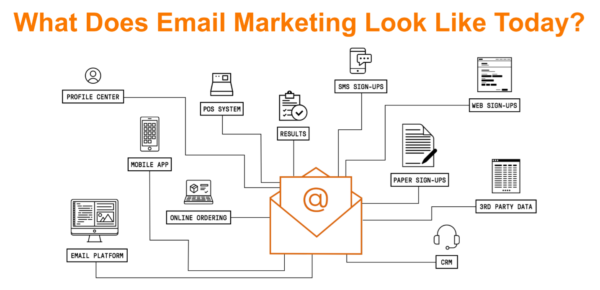
Email marketing is an effective way to nurture leads and maintain client relationships in real estate.
Targeted campaigns keep your audience informed and engaged with your services and listings.
Building and Nurturing Your Email List
An email list is a valuable asset for real estate marketing:
- Sign-Up Forms: Implement sign-up forms on your website and blog. Offering incentives like market reports or informative guides can encourage sign-ups.
- Segmentation: Segment your email list based on criteria like location, buying stage, and interests. This allows for more personalized content delivery.
- Nurturing Leads: Send regular newsletters filled with valuable information, including tips, market updates, and property listings, to keep leads engaged.
Effective Email Campaign Strategies for Real Estate
To maximize engagement and drive sales, consider these effective email campaign strategies:
- Personalization: Personalize emails with the recipient’s name and relevant details. Personalized emails tend to have higher open and click-through rates.
- Content: Provide meaningful content like market insights, new listings, and buying tips. Avoid overly promotional messages to maintain reader interest.
- Automated Campaigns: Utilize automated email campaigns to send timely and relevant messages. For example, set up a welcome series for new subscribers.
- Call-to-Action: Include clear calls-to-action in your emails, encouraging recipients to contact you, visit your website, or schedule a viewing.
Traditional Marketing Techniques for Real Estate
Traditional marketing techniques continue to be effective in reaching local audiences.
By utilizing print advertising, real estate agents can provide a comprehensive approach to attracting and engaging potential clients.
Print Advertising Methods
Traditional marketing methods still hold value in real estate marketing:
- Flyers: Distribute flyers in high-traffic areas and community centers to highlight key property features and include your contact information.
- Brochures: Create professional brochures that showcase your listings with high-quality images and detailed descriptions.
- Direct Mail: Send postcards and newsletters to targeted neighborhoods to keep your brand visible to potential clients.
Hosting Successful Open Houses
Hosting successful open houses is vital for showcasing properties and attracting potential buyers.
Careful planning and technology can enhance the open house experience and generate strong leads for your real estate business.
Planning and Executing a Successful Open House Event
Open houses offer an excellent opportunity to showcase properties effectively:
- Promotion: Advertise your open house through your website, social media platforms, and your email list. Use eye-catching signs in the neighborhood to attract attention.
- Preparation: Ensure the property is clean, staged, and presented well. Providing brochures and information sheets can enhance the visitor experience.
- Engagement: Greet visitors warmly and be ready to answer their questions. Collecting contact information during the event is essential for follow-up.
Using Technology to Enhance Open House Experiences

Technology can significantly enhance your open house events:
- Virtual Tours: Offer virtual tours for potential buyers who cannot attend in person, expanding your reach to a broader audience.
- Chatbots: Implement a chatbot on your website to answer questions and schedule viewings. A real estate chatbot can provide instant responses to inquiries.
- Mobile Apps: Use mobile apps to manage sign-ins and follow-ups during open houses. This streamlines the process and ensures you capture all potential leads.
Measuring Success in Real Estate Marketing
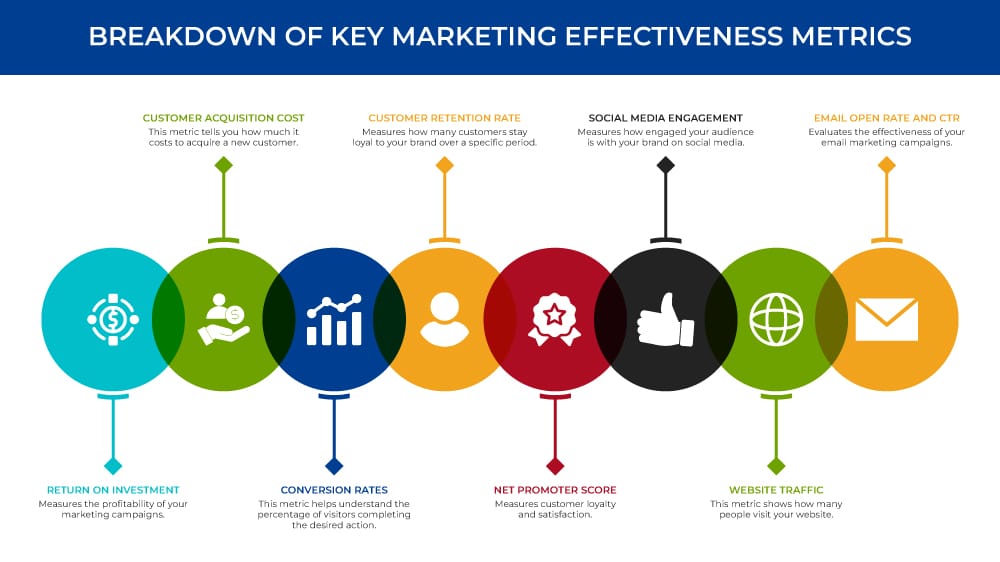
Measuring success in real estate marketing is crucial for understanding the effectiveness of your strategies and optimizing your performance.
By tracking key metrics and utilizing analytics tools, you can make informed, data-driven decisions that enhance your marketing efforts and ultimately lead to better results.
Key Metrics to Track and Analyze
Tracking the right metrics is essential for evaluating your marketing efforts effectively. Here are some key metrics to focus on:
- ROI (Return on Investment): Calculate the return on investment for your marketing campaigns. This metric helps you understand the cost-effectiveness of your strategies, allowing you to allocate resources more efficiently.
- Conversion Rates: Measure the percentage of leads that convert into clients. High conversion rates indicate effective marketing and suggest that your messaging resonates with your audience.
- Website Traffic: Monitor website traffic to assess how many visitors are engaging with your content. Analyzing traffic sources can help you identify which channels drive the most visitors to your site.
- Lead Generation: Track the number of leads generated from different marketing channels. This insight helps identify the most effective tools and tactics in your marketing strategy.
Tools for Real Estate Marketing Analytics
To effectively track and measure your real estate marketing success, utilize the following analytics tools:
- Google Analytics: This powerful tool allows you to monitor website traffic, user behavior, and conversion rates.
It provides insights into which pages are performing well, how users navigate your site, and what content keeps visitors engaged.
- CRM Systems: Customer relationship management (CRM) systems like Salesforce or HubSpot enable you to track interactions with leads and clients.
By analyzing this data, you can manage and refine your marketing efforts, improving communication and follow-ups.
- Email Marketing Tools: Platforms such as Mailchimp and Constant Contact provide detailed analytics for your email campaigns.
Track metrics like open rates, click-through rates, and conversions to evaluate the effectiveness of your email marketing strategies.
Conclusion
In the competitive world of real estate marketing, implementing effective real estate marketing strategies is vital for success.
By optimizing your website for search engines, focusing on content marketing, and utilizing both traditional and digital marketing techniques, you can enhance your visibility and attract potential clients.
Key metrics such as ROI, conversion rates, and lead generation play a significant role in measuring the success of your real estate marketing efforts.
Tools like Google Analytics, CRM systems, and email marketing platforms are essential for tracking your progress and refining your strategies. As you embrace the evolving landscape of real estate marketing, remember that a strong online presence and engaging content are your best allies.
By continually monitoring and optimizing your real estate marketing strategies, you can position yourself as an industry expert and achieve lasting success in real estate marketing.
Stay proactive, adapt to market changes, and leverage the right tools to maximize your marketing efforts and drive growth.
Frequently Asked Questions (FAQs)
What are the most effective real estate marketing strategies?
To create a successful real estate marketing plan, combine traditional methods such as print advertising and direct mail with digital tactics like social media marketing, email newsletters, and video tours.
This comprehensive approach helps you effectively reach a wide audience and enhance your overall real estate marketing efforts.
How can social media boost my real estate marketing?
Social media platforms like Facebook, Instagram, and LinkedIn are essential tools in real estate marketing.
They enable you to engage with potential clients, showcase properties, and share valuable content, ultimately increasing your visibility and generating leads for your real estate marketing initiatives.
Why is video marketing important in real estate marketing?
Video marketing is a powerful component of real estate marketing, offering immersive property tours and engaging content.
This allows potential buyers to visualize homes remotely, which increases interest and accelerates the decision-making process in your real estate marketing strategy.
How do I measure the success of my real estate marketing campaigns?
To assess the effectiveness of your real estate marketing campaigns, track key metrics such as website traffic, lead generation, conversion rates, and social media engagement.
Use tools like Google Analytics and social media insights to evaluate and optimize your real estate marketing strategies.
What role does a CRM system play in real estate marketing?
In real estate marketing, a CRM system is vital for managing leads, tracking client interactions, and automating follow-ups.
This ensures that no opportunities are missed, ultimately enhancing your efficiency and client relationship management in your real estate marketing efforts.
How can I use email newsletters effectively in my real estate marketing?
Email newsletters are an effective tool in real estate marketing for keeping your audience informed about new listings, market trends, and helpful tips.
By maintaining regular communication, you build trust with potential buyers and sellers, enhancing your overall real estate marketing strategy.



